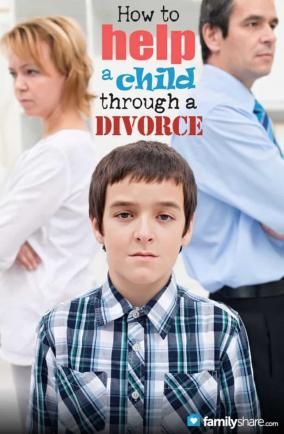
I will never forget the day when I was digging in my garden, and my young neighbor Mitchell* came walking along the alley that separates his house from mine. He stopped outside the gate like he wanted to talk to me, a sad frown on his face.
"Hey Mitch,"� I remember saying as I stood and walked over the gate to talk to him, wondering why he didn't have his usual trademark smile on his face.
"Hey,"� he said, his voice soft as his fingers hooked into the wires of the chain link fence between us.
This wasn't like Mitchell. He is usually a vivacious and talkative boy.
"What's up?"� I asked.
To this simple question, the poor boy dropped his head, and burst into sudden tears.
Alarmed, I went through the gate, and put my arm around the crying child.
"What's wrong Mitchell?"� I asked again.
At first, Mitchell couldn't speak through his sobs, but when he finally was able to speak, my heart sank at what he said: "My mom and dad are getting a divorce!"�
There are many things that teachers, relatives, care providers and other caring adults can do to help children whose parents have been divorced, or are in the process of divorcing. Perhaps the three most important steps a caring adult can take to support children through this difficult time, are to help children remember that they can still love both parents, that they have friends (both kids and grownups) who support them, and that what has happened between their parents, is not their fault.
Children still love both parents
First of all, children often feel as if they have to take sides in a split between their parents; that in order to be loyal to one parent, they cannot be loyal to the other. It is important for caring adults in the life of a child who is experiencing divorce to help the child know that this is simply not true. A child has the right to love both parents just as much as before even though the parents don't live in the same house any more.
An adult caregiver or relative can encourage the child in this by always speaking positively of both parents. This can be difficult if the caring adult is a friend or relative of one of the parents and has opinions connected to the divorce. However, it is vital that she keep her opinions to herself when communicating with the child. Always staying positive about both parents, regardless of personal bias is important for the happiness and well being of the child who cares about both his parents, and wants to love them both.
Children have the support of others
It is important to help the child remember that he has a support system that he can turn to for advice or just to cry and talk about his feelings. While I was sad for Mitchell the day that he came to tell me what was going on between his parents, I was honored that he felt safe talking to me about the situation. I was glad that I was able to do what I could to comfort him. I am pleased when I see Mitchell hanging out with my own or other children, and laughing and playing as he used to do. I also know that he has other caring adults, teachers and grandparents who love and care for him just as they always have, and that has made a big difference in helping Mitchell through the sorrow of his parents splitting up.
The children are not at fault
It is important for caring adults to help children understand that the difficulties between their parents is not their fault. Often, a child may think, "If I had just been a better child"�"� "If I'd tried harder in school"�"� or "If I had just worked harder to keep my parents together"�"� then their parents would not have separated. But none of these ways of thinking are correct. A divorce is never a child's fault, and children should never have to feel responsible or guilty for the difficulties between their parents.
Caring adult relatives, teachers and caregivers need to be mindful that children may be unnecessarily taking on feelings of guilt and responsibility, and these adults need to help children eliminate these thoughts from their minds. Often, simply sitting with a child and reminding him that what has happened is not because of anything he did, can do a lot to help relieve children of these unnecessary feelings.
Divorce is always difficult and painful - especially for the children. The adults in these childrens' lives can help by being mindful of their needs and do what they can to be supportive. Supportive adults can help children understand that they still have the right to love both parents, they have supportive friends and relatives and that what happened is not their fault.
*Name has been changed.

